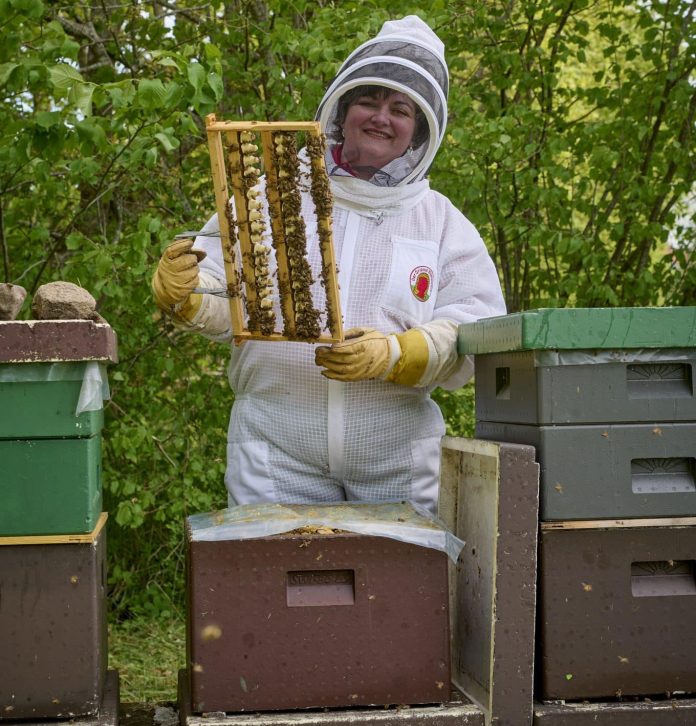There is a lot of work behind the little jar of honey that we put on our breakfast tables. Monica Larsson from Bjäre, Sweden, is one of the first female master beekeepers in Sweden, the only female professional announced by the Swedish Crafts Council (Sveriges Hantverksråd) and the only currently active female Bee Master in Sweden.
– It feels great to have come this far in my career as a beekeeper. Working with living creatures is a challenge and every year offers something new that is part of the learning process. The honey is never the same from one year to another! Monica Larsson is born in Romania and moved to Sweden in 2002. In her home country her father had some beehives that she helped with but at the time she had little interest and just liked the honey.

When she moved to Sweden and met her husband they decided to get some bee colonies for housing needs, and this is how the journey began. Today both she and her husband work with beekeeping only, producing between 20-30 tons of honey depending on the year and weather. In the life of a beekeeper every day is different.
– You can have a plan, but sometimes we have to make big changes depending on the weather or flowering season. When it’s high season, we can work 12 hours every day including weekends, but then again we can take a little more time off in the winter. We follow nature like any farmer, no set times!
Real and fake honey
Raw honey is the product that bees make from nectar. To be called honey, nothing must have been added or taken away. One of the biggest challenges beekeepers face today is that the market is invaded by honey that is so called ‘fake’ and often imported. It can be diluted with cheaper sugars, such as fructose or corn syrup, or cans are, for example, labeled in a misleading or incorrect way. The biggest challenge today is getting the consumer to make the right choice when it comes to honey, Monica Larsson says.
Unfortunately, the taste of fake honey is difficult to distinguish from real honey, especially for untrained taste buds. It is therefore important to be careful and choose trusted sources when buying honey to avoid being deceived by fake products.

– There are many beekeepers who have chosen to shut down due to financial consequences and then we will have problems from the pollination point of view. Farmers will get less harvests and food production may suffer because there are not enough bees and beekeepers, Monica Larsson says. Monica herself has replaced almost all sugar with honey. On porridge with fresh berries, in baking, smoothies, lemonade, on vanilla ice cream, for grilling, sauces and more.
– Pancakes with cream and honey, is a great combination! And soon there will be

midsummer and we will have new, fresh honey and strawberries. Another favorite recipe is vanilla ice cream, strawberries and honey! Everyone must try it!
Pollination is a fundamental process for the survival of our ecosystems. Nearly 90% of the world’s wild flowering plant species depend, entirely, or at least in part, on animal pollination, along with more than 75% of the world’s food crops and 35% of global agricultural land. Not only do pollinators contribute directly to food security, but they are key to conserving biodiversity. Bees and other pollinators, such as butterflies, bats and hummingbirds, are increasingly under threat from human activities.
To raise awareness of the importance of pollinators, the threats they face and their contribution to sustainable development, the UN designated 20 May as World Bee Day.




